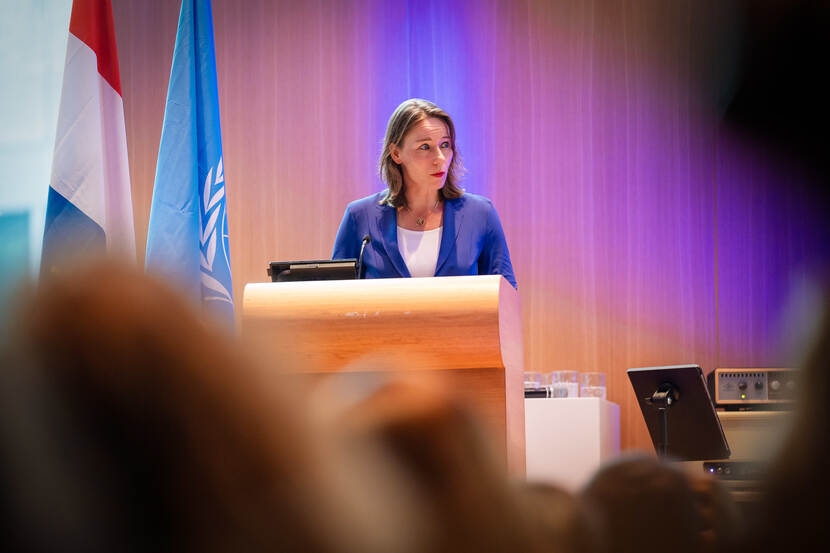Speech by Minister Bruins Slot at the UNESCO International Conference on Cultural Heritage and Peace
Speech by Minister of Foreign Affairs Hanke Bruins Slot at the UNESCO International Conference on Cultural Heritage and Peace, 13 May 2024, The Hague.
Your Excellencies,
Esteemed guests,
I start with a quote: ‘A callous assault on the dignity and identity of entire populations’.
That was how ICC prosecutor Fatou Bensouda described the destruction in 2012 of centuries-old mausoleums in Timbuktu.
In saying this, she got to the heart of the matter.
Cultural heritage is not only about bricks and mortar, art and books.
It’s also about flesh and blood, identity and a sense of belonging. I agree
In 1999, as young student, I was in the Croatian city of Dubrovnik to take a course at the university of the city.
And I still remember the course it was: In- and Exclusion in Contemporary European Societies. But I also vividly remember the damages in the historical center caused by shelling in 1991.
And that devastation that had just one aim: to destroy the Croatian identity.
It showed that cultural heritage is not only something of the past.
It constitutes the present.
And it is the present that lays the foundations for future generations.
And that’s why the destruction of cultural heritage during armed conflict is not only tragic, but also a war crime.
And your dedication to preventing such destruction and prosecuting perpetrators is extremely valuable.
Unfortunately, your work is very much needed.
Since the turn of the century, we have witnessed the destruction of hundreds of historical sites in Afghanistan, in Mali, in Iraq, in Syria.
And these kinds of attacks are continuing on a large scale.
Since the large scale Russian invasion of Ukraine in 2022, almost 350 cultural sites in the country have been destroyed.
Including the Transfiguration Cathedral in Odesa, Mariupol’s famous theatre and the historic Freedom Square in Kharkiv.
More than 15,000 Ukrainian artworks and artifacts have been reported missing.
And in the meantime, more than 40 sites of historical importance have been destroyed or damaged in Gaza in the last months.
So today, The Hague Convention for the Protection of Cultural Property in the Event of Armed Conflict – signed here exactly 70 years ago – is more relevant than ever.
And I’m grateful to be here with so many of you to mark this milestone in its history - and the good work that is being done to safeguard cultural heritage.
Work that’s being done by you: representatives of the armed forces and governments, and employees of organisations like Blue Shield International and Cultural Emergency Response.
And you play a crucial role in drawing attention to the preservation of cultural heritage during wartime.
You do so by enforcing safeguards for its protection.
By providing armed forces to ensure that cultural heritage is respected and protected.
And by using new technologies to analyse satellite images and collect evidence of war crimes.
And I’m glad to see increasing international cooperation: at both military and political level.
Because it’s our common duty to safeguard the heritage of mankind.
In this regard, I’m pleased that this year’s 70th anniversary has prompted several countries to join the Convention and its protocols.
And the Netherlands, a pioneer of the Convention after the Second World War, has strongly supported efforts to persuade new countries to sign up.
And we cordially invite all countries that have not yet signed or ratified to do so.
And this certainly also applies to the Second Protocol to The Hague Convention, agreed in 1999: an update that incorporated the latest legal insights after the war in the former Yugoslavia.
Signing the Convention and its protocols is a strong sign of commitment to the protection of cultural heritage.
It is our duty to honour that commitment for future generations.
Your Excellencies,
Esteemed guests,
The Convention is not a dead letter.
Your work is paying off.
Fortunately, the shelling of Dubrovnik and the destruction of cultural heritage in Timbuktu were followed by criminal convictions.
Yet while justice was served on these occasions, many more perpetrators must be held to account in the future.
We have to protect our cultural heritage even more effectively.
Because every building destroyed is a body blow to someone’s identity.
Shattering not just bricks and mortar, but the memories and history that lie within.
It is as the Ukrainian philosopher Volodymyr Yermolenko said. And I quote: ‘Heritage is something that ensures a connection between the dead, the alive, and the not yet born.’
Therefore, the protection of cultural heritage is not a minor matter – and it is crucial to the dignity and identity of entire populations.
Thank you.
